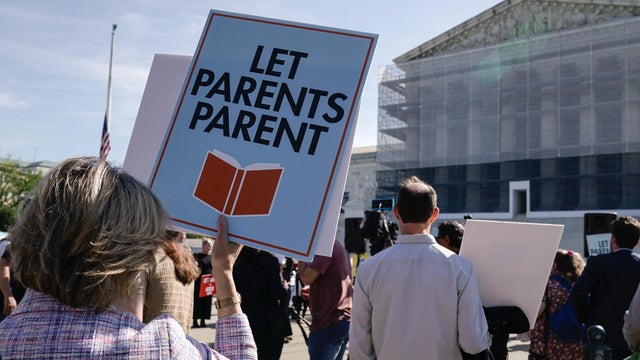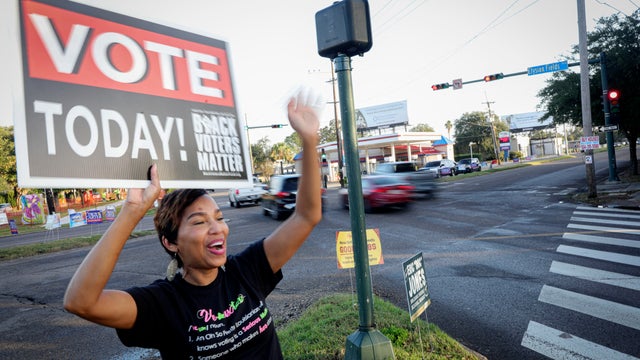

No response returned

Washington — The Supreme Court on Friday ruled in favor of a group of Maryland parents who to deny them the ability to opt their elementary-aged children out of instruction featuring storybooks that address gender identity and sexual orientation.
The high court said in a in the case of Mahmoud v. Taylor that the government burdens parents' religious exercise when it requires their children to participate in instruction that violates the families' religious beliefs. Justice Samuel Alito authored the majority opinion, with the three liberal justices — Sonia Sotomayor, Elena Kagan and Ketanji Brown Jackson — in dissent.
The court's conservative majority said that the parents who brought the case are entitled to a preliminary injunction while their lawsuits proceed. The high court ordered the board to notify parents in advance when one of the story books at issue in the case will be used, and allow them to have their kids excused from the instruction.
"[W]e hold that the Board's introduction of the 'LGBTQ+-inclusive' storybooks — combined with its decision to withhold notice to parents and to forbid opt outs — substantially interferes with the religious development of their children and imposes the kind of burden on religious exercise" that the court has previously ruled is unacceptable, Alito wrote.
"We reject this chilling vision of the power of the state to strip away the critical right of parents to guide the religious development of their children," Alito added later in the opinion.
Sotomayor read her dissent aloud from the bench. In her opinion, she wrote, "Simply being exposed to beliefs contrary to your own" does not amount to prohibiting the free exercise of religion.
"The result will be chaos for this nation's public schools. Requiring schools to provide advance notice and the chance to opt out of every lesson plan or story time that might implicate a parent's religious beliefs will impose impossible administrative burdens on schools," Sotomayor wrote, later warning that it would force courts to resolve a "new font" of litigation and leave judges as the decision-makers on policies governing school material related to gender and sexuality.
The ruling from the Supreme Court came in one of three cases before the justices this term that involve religious rights. The high court, which has a 6-3 conservative majority, has in recent years been sympathetic to plaintiffs raising claims of religious discrimination.
involves public-school instruction in Montgomery County, Maryland, which is home to the state's largest school system with more than 160,000 students. Montgomery County, like most states, had a policy that allowed parents with religious objections to classroom instruction or activities to excuse their children, as long as the opt-out requests did not become "too frequent or burdensome," according to court filings.
The Montgomery County Education Board added "LGBTQ-inclusive" storybooks into its English Language Arts curriculum for elementary school students after Maryland enacted rules seeking to promote "educational equity." The school district said it wanted to supplement its Language Arts books with a handful of stories "in order to better represent all Montgomery County families." The books added include titles like "Born Ready," which is about a transgender elementary-aged child, and "Prince & Knight," which tells the story of a prince who falls in love with and marries a knight.
Both the majority and dissenting opinions included pages from the storybooks, though the justices disagreed as to their messages.
Alito wrote that the books "unmistakably convey a particular viewpoint about same-sex marriage and gender," and are "designed to present certain values and beliefs as things to be celebrated and certain contrary values and beliefs as things to be rejected."
But in Sotomayor's view, the books introduce readers to LGBTQ characters, but drawn on common themes presented to children in other works, such as overcoming difficulties, celebrating milestones or fairytale romances.
The school board adopted the lessons in 2022 and allowed parents to opt their children out of reading and instruction involving the picture books. But in March 2023, it ended the policy and said families would no longer receive advance notice of when the books would be read, and would not be able to have their children excused from the instruction.
The Board of Education had said that the opt-outs had become "unworkable," since some schools had high numbers of absences. It said all faced "substantial hurdles" in using the books while honoring opt-out requests, as teachers had to manage the removal of excused students from class and plan alternative activities for them.
That decision, though, sparked backlash throughout the community, with more than 1,000 parents signing a petition that called on the board to restore the opt-outs and dozens appearing at board meetings.
Three Montgomery County families filed a lawsuit against the education board over the decision to end the opt-outs, arguing it violated their First Amendment right to free exercise of religion because it overrode their freedom to direct the religious upbringing of their children. The families are a diverse coalition of religions — Muslim, Roman Catholic and Ukrainian Orthodox.
A federal district court in Maryland and the U.S. Court of Appeals for the 4th Circuit ruled for the school board, finding that there was no evidence that the families were compelled to violate their religious beliefs or conduct.
The Supreme Court heard arguments in the case in late April.





